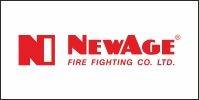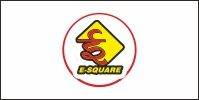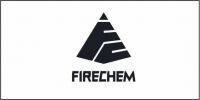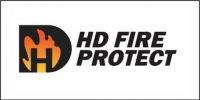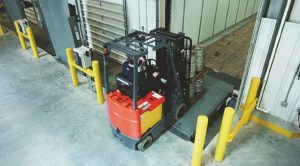 During wet, snowy and icy conditions, the area surrounding your loading dock can be as hazardous – or even more hazardous – as an icy sidewalk or a wet entryway. These tips can help you prevent employee injuries.
During wet, snowy and icy conditions, the area surrounding your loading dock can be as hazardous – or even more hazardous – as an icy sidewalk or a wet entryway. These tips can help you prevent employee injuries.
Workplace injuries and accidents that cause employees to miss six or more days of work Two of the leading causes of these costly injuries: overexertion and slips and falls on the same level.
Loading docks can be dangerous for workers. The speeds at which many material handling operations take place dictate a certain degree of risk. The conditions outside your loading dock greatly can enhance the probability of one of those risks: a worker slipping and falling.
One way to reduce this risk is to minimize the infiltration of outside elements – like rain and snow – from getting into the loading dock area. This can be done using a system of dock sealing products to get a complete, tight seal at each loading dock opening. Here are some tips for achieving a complete seal:
1) Look for Light
The first step in getting a complete seal at the loading dock is to look for daylight. When a trailer is in place and the dock door is opened, examine the perimeter around the trailer and dock leveler and look for areas where you can see light.
Simply put, if there's daylight, there's a gap, which means rain, snow, dust and other outside contaminants can enter the facility. Different gaps will need to be sealed by different products. Understanding what kinds of gaps exist will lead to more informed decisions on properly sealing them.
2) Seal the Top
Gaps along the top of the trailer can be common when a dock seal with head curtain or a dock shelter is used. Head curtains can help seal some gaps, but getting a true seal and preventing precipitation from getting into a facility is a challenge.
To get a tight seal at the top of the trailer with an existing dock seal, consider using a secondary overhead sealing product that uses weight and gravity to create a solid connection with the trailer top. The weight guarantees a tight, consistent seal across the full width of the trailer as it bounces during loading and unloading. Today's advanced dock shelters incorporate this type of weighted head curtain, accomplishing a tight seal without the need for an additional overhead rain diversion device.
3) Seal the Sides
Foam compression-style dock seals generally offer a good seal along the sides, keeping rain and other contaminants out. However, they can suffer significant wear-and-tear due to constant friction. Additionally, foam and other material can protrude inside of the trailer when compressed, interfering with forklift loading. In contrast, perimeter-sealing dock shelters offer full access loading since they seal along the side of the trailer, but unless the right model is selected, gaps often exist.
Swing-open trailer doors usually lead to 1- to 2-inch gaps. While that might seem insignificant at first glance, it equates to a 2.5-square-foot hole at just one dock opening. That's a lot of rain potentially entering the facility. The solution is to find a shelter with side curtains featuring a fabric-covered hook on the leading edge. This seals that gap and minimizes the intrusion of outside elements.
4) Remember the Fourth Side
While it is critical to effectively seal gaps at the top and along the sides of the dock opening using a dock seal or shelter, don't forget the “fourth side” – the bottom. Gaps typically exist below and around the dock leveler and bumpers, and present stubborn challenges for sealing out contaminants.
Installing an under-leveler pit seal provides a barrier against these infiltrators. Inside the facility, lip corner seals, filler pads and other components help fill tough-to-seal gaps where the dock enclosure, leveler and bumpers all meet.
5) Consider Vertical-Storing Levelers
The gold standard in environmental protection of dock openings, vertical levelers differ from pit-style levelers in that they allow the loading dock door to close directly onto the pit floor, minimizing outside air and water infiltration. This configuration also allows trailer doors to be opened inside the facility, which further enhances environmental and product control inside the loading dock area. This “drive-through” approach ensures that there's never a chance for outside precipitation to get into the facility if workers practice the proper sequence of operation.
6) Combatting Condensation with HVLS Fans
Precipitation is not the only cause of wet floors. Slippery spots can develop due to condensation. Moisture develops when warm, humid air enters a facility and condenses on surfaces that are at or below the dew point temperature. Often, this happens on the floor, called sweating slab syndrome (SSS).
Many large facilities provide little air movement and exhaust interior air through roof vents, creating negative pressure in the building, which quickly allows exterior air and other conditions to enter the building when loading dock doors are open. High-volume, low-speed (HVLS) ceiling fans can help reduce or eliminate SSS by minimizing ceiling-to-floor temperature differentials through a process called “destratification” and increasing the surface evaporation rate. In addition, commercial dehumidification units can alter the interior building environment to help reduce or eliminate SSS.














